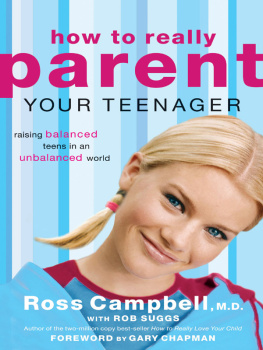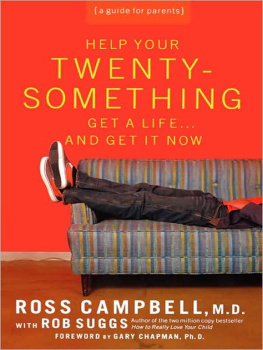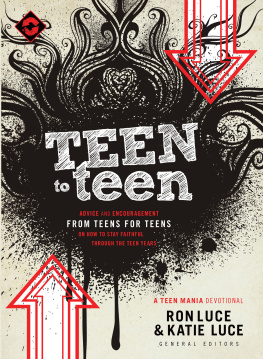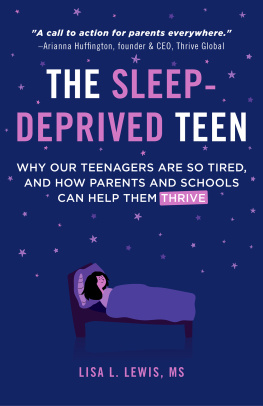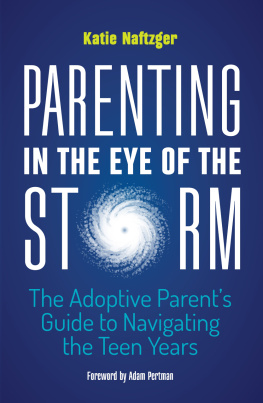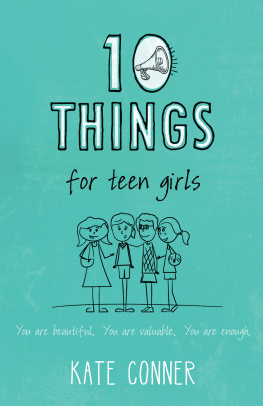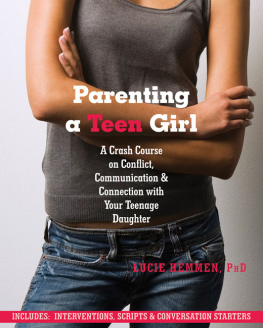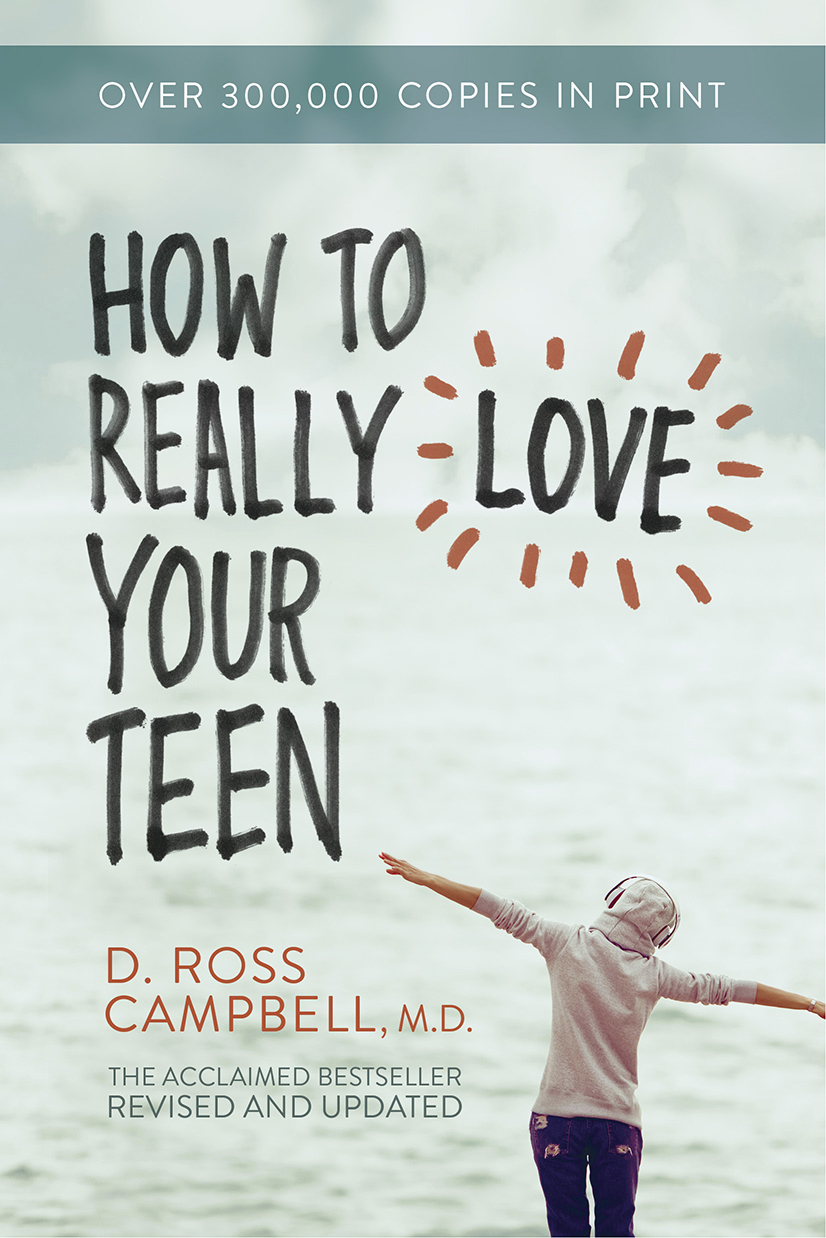Contents
Foreword
How to Really Love Your Teen appeals to my sense of values, particularly since we live in a society that too often emphasizes the selfish and materialistic. This book of commonsense guidelines shows how parents may more than simply coexist with a teenagerit shows how they can develop the relationship into something rewarding and enriching.
Roger and I have five children. In 1981, when I was asked to write the Forword, our eldest was a teenager and two more were on the verge of adolescence. For us, Dr. Campbells book was not only instructive but most timely.
One of the strengths of the book is its simplicity, as it focuses on basics that can be incorporated into everyday life. I especially appreciated the sections about dealing with anger and frustration and about the need for unconditional love. And I was thankful for Dr. Campbells reassuring message for parents as we cope with the moods and crises of our teenagers.
There is a recurring theme in the book that I heartily endorsethat as parents we should put our lives in order, physically, morally, spiritually, because we are role models for our children. If we accept Dr. Campbells advice, I believe that we and our children will profit.
This is a book youll want to read and then pass along to your friends.
Marianne Staubach
Dallas, Texas
Preface
Guiding a child through the teenage years is a complex venture and one most parents today have great difficulty with. In almost every respect, the adolescent situation is becoming worse year after year. Teenage suicide has increased so dramatically that it is now the second leading cause of death for people between the ages of fourteen and twenty. Academic achievement scores and standards have steadily gone down over the last several years. Drug abuse, juvenile crime, teenage pregnancy, sexually transmitted diseases, and feelings of despair are all statistically overwhelming.
Whats wrong? The primary source of the problem usually lies with parents who do not have a balanced perspective about how to relate to their teenagers. Most parents have distorted ideas of what adolescence is and what they should expect of their young people.
Although most parents truly love their teenagers, they dont know how to convey that love in ways that make the teenagers feel loved and accepted. However, parents who really desire to give their teenagers what they need can learn to do so.
I have found that parents who put into practice the principles discussed in this book have a high degree of success in helping their teenagers develop properly and become responsible, mature, and conscientious adults.
Some of the basic material for this book is from my first book, How to Really Love Your Child . Since the needs of teenagers are more complex than those of younger children, its necessary to apply the information differently.
As you integrate the ideas in this book into a solid and balanced approach for relating to your teenager, youll be pleasantly surprised to discover how exciting and fulfilling it can be to really love your teenager.
Many case studies from my files and my memory are used in these pages for illustrative purposes. In all cases real names are not used, and circumstances have been changed enough to protect the identity of my clients.
Chapter 1
Teenagers: Children in Transition
I cant believe she did it, explained Mrs. Batten as she and Mr. Batten began to unfold their painful story in my counseling room. She was such a good girl, always content, never gave us much trouble. I thought we were giving Debbie everything she neededclothes, church, a good home.
Why would she ever want to try to kill herself? How could she have taken all those pills? Does she really want to die, or is she just trying to get attention? Im so confused. And shes gotten so hateful and sullen. I cant talk to her, and she wont talk to me. She just wants to spend time by herself in her room. And her grades have become terrible.
Mrs. Batten sat in her chair, her shoulders slumped, the sparkle missing from her usually bright eyes. As she told me more of her daughters problems, I knew that she was as confused and lonely as Debbie. This was a typical example of the gap in understanding how to love a teenager.
When did you notice these changes in Debbie? I asked.
About two or three years ago, replied Mrs. Batten. But it was so gradual we didnt think anything was seriously wrong until fairly recently. Lets see. Shes fifteen now. During the last few months of sixth grade we noticed she became boredfirst with school. Her grades began falling. A teacher complained of her daydreaming and nonparticipation in class. She was very concerned about Debbie then. I wish we had listened to Mrs. Collins. She was such a fine teacher.
Then Debbie gradually became bored with life. She gave up her favorite activities one by one and seemed to lose interest in everything, including church. She began to avoid her good friends and spend more and more time by herself. She talked less and less.
But everything became even worse when she began seventh grade. She completely withdrew from her old standby friends and began running around with kids who were in trouble most of the time. Debbies attitude worsened as she became more like her new friends. And they often led her into troubledeep trouble.
Yet weve tried almost everything, Mrs. Batten continued. First, we spanked her. Then we began taking away her privileges and freedoms. Weve grounded her. Weve tried rewarding her for good behavior. Weve talked to everyone we thought might be able to help us. I really believe we have tried everything. Can Debbie really be helped?
Were desperate, Mr. Batten interjected. Did we do a poor job as parents? Weve certainly tried hard enough. Is it inherited? Maybe physical? Should we get a sugar test or an EEG? Will vitamins or minerals help? We love Debbie, Dr. Campbell. What can be done? Is it hopeless?
I saw Debbie after her parents left. She was a pretty girl with likable ways. Although unquestionably intelligent, she had difficulty speaking in a clear, audible way. She communicated mostly in grunts with many uh-huhs. Debbie did not have the natural spontaneity and enthusiasm we like to see in a fifteen-year-old girl. She was obviously unhappy, and it was difficult to communicate with her.
However, when Debbie felt more comfortable, she spoke more freely and her eye contact improved. She stated by her behavior and in her words that she had lost interest in all she once cared for. She finally said, Nothing really matters. No one cares about me and I dont care about anything. It doesnt matter anyway.
As the conversation continued, it became clear that Debbie was suffering from an increasingly frequent and serious adolescent problemdepression. She seldom felt content with herself or her life. For years Debbie had longed for a close, warm relationship with her parents, but during the past few months, she had gradually given up hope in this dream. More and more she turned to her peers, who she thought would accept her more lovingly; but her unhappiness deepened.
Sad to say, Debbie is typical of many adolescent girls. Debbie seemed to be happy and content during her earlier years. During those years, she was a complacent child who made few demands on her parents, teachers, or others. So no one suspected that she did not feel genuinely loved and accepted by her parents. Though she had parents who deeply loved her and cared for her, Debbie did not feel genuinely loved. Yes, Debbie intellectually knew of her parents love and care for her and never would have told you that they didnt love her. But Debbie didnt have the precious and crucial feeling of being completely and unconditionally loved and accepted.


